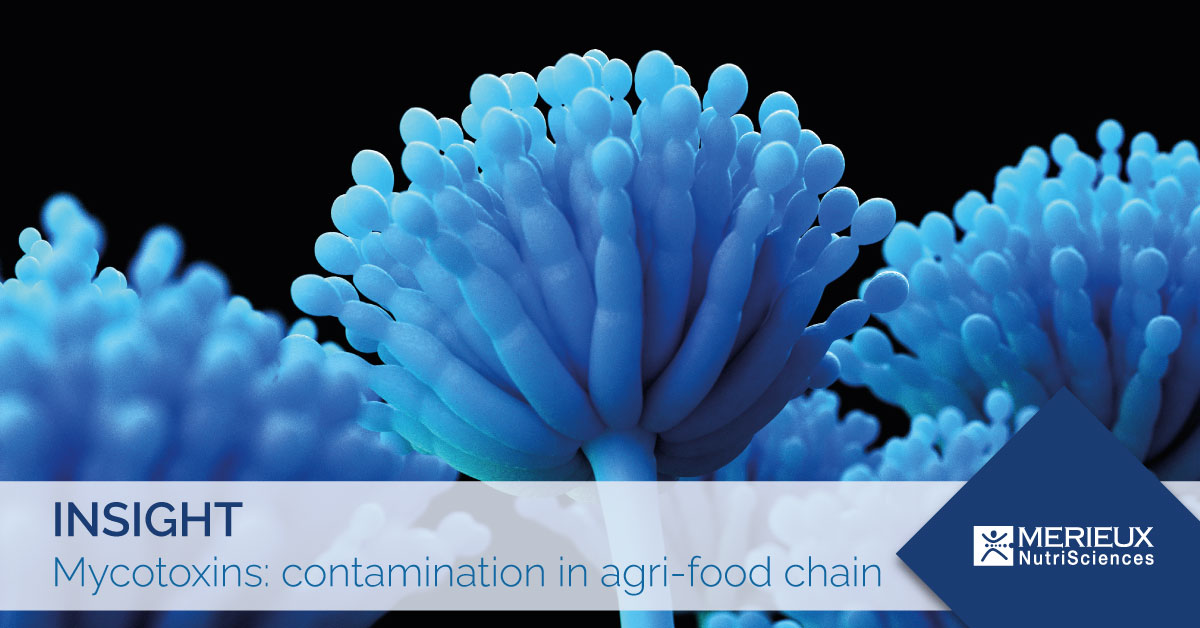MYCOTOXINS: HOW TO PREVENT CONTAMINATION IN THE AGRI-FOOD CHAIN

Mycotoxins are toxic secondary metabolites produced by numerous fungal species (genus Aspergillus spp., Fusarium spp., Penicillium spp., Alternaria spp. and Claviceps spp.) which can contaminate food and feed causing serious consequences on human and animal health such as gastrointestinal disorders, kidney problems, liver damage, immunodeficiency and cancer.
Mycotoxins can contaminate cereals and derivatives, dried fruits, spices, wine, beer, coffee, milk, eggs, meat products and feed. The main mycotoxins of food interest are Aflatoxins, Ocratoxins, Tricotecens, Zearalenone, Fusaproliferin, and some emerging mycotoxins such as Beauvericin, Enniatina, Ergot alkaloids, Alternaria toxins and Patulin.
In food companies, the risk management of mycotoxins contamination is mainly based on two strategies:
1. Good Agricultural Practices (GAP) and Good Practices of the product transport/storage (GSP). Compliance with these requirements includes:
- the remediation of the soil before each crop.
- the use of certified seeds and resistant crop varieties.
- the crop rotation and the correct time of harvest.
- the control of weeds by appropriate concentrations of fertilizers and fungicides.
- the cleaning of transport containers.
- the short transport times with correct temperature and humidity conditions.
- the protection of products from mechanical damage and accidental infestation of parasites.
2. Good Hygiene Practices (GHP) and Good Manufacturing Practices (GMP). Compliance with these requirements includes:
- the careful design of the structures and production plants in order to minimize the risk of contamination of the production and to favor the maintenance and sanitization procedures.
- the correct storage of raw materials in order to avoid accidental contamination.
- the careful monitoring of the manufacturing process in terms of time, temperature, humidity, water activity, oxygen concentration and other chemical-physical-biological parameters that could favor the growth of toxigenic fungi.
- the careful packaging / labeling / storage phases of the finished product.
- the staff training about the risk of mycotoxin contamination and about the correct hygiene practices to be followed during food processing and personal hygiene.
However, despite the implementation of these preventive measures aimed at reducing / eliminating the risk of mycotoxins, often the food contamination is unavoidable due to adverse environmental factors, process errors, etc. In these cases, a valid support for food detoxification is offered by:
- physical methods such as sieving (removal of dust, debris, etc.), decortication, irradiation, heat treatments, use of adsorbent materials.
- chemical methods such as the processes of ammoniation, ozonation, nixtamalization etc.
- biological methods such as the microbial or enzymatic decontamination etc.
Furthermore, it is also important to have a specific monitoring plan that detects the accidental presence of mycotoxins during food production. A good monitoring plan is based on the use of sensitive, innovative, rapid and validated analytical methods such as immunoassays, immunosensors, biosensors, spectroscopy, MOS etc. able to detect small quantities of these metabolites at any time in order to allow the implementation of appropriate corrective actions.
The first 2 months of 2021 were characterized by over 100 food alert cases related to the presence of aflatoxins (90%), patulin, deoxynivalenol, fumonisins and ochratoxins (10%) and the most involved product categories were nuts, seeds, fruit, vegetables, legumes, cereals, bakery products and spices. (Data source: Safety Hud). These data suggest that a greater attention to the problem and a better management of this risk is needed to ensure the success of company productivity and the protection of public health.

